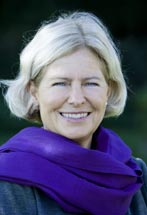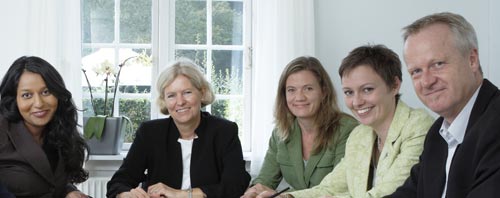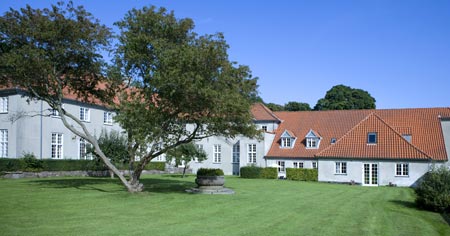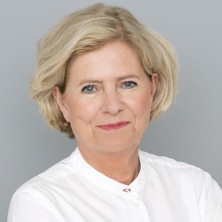Interview with Lise Lotte Bundesen, Director, Ida Institute

Lise Lotte Bundesen
SMAKA: Today I'm speaking with Lise Lotte Bundesen, Director of the Ida Institute. Thank you so much for joining me today.
BUNDESEN: Thank you for having me.
SMAKA: Can you tell me about your background and how you came to the institute?
BUNDESEN: Sure. I have a master's in English literature and language from the University of Copenhagen, and also a master's in American government and communication from the University of Notre Dame. For a number of years I worked for Novo Nordisk group, which is a large Danish biotechnology company. I held different positions at Novo Nordisk, in customer service, training, advertising, and public relations and environmental affairs. I've also been teaching at Copenhagen Business School.
In September of 2007, I was hired to establish the Ida Institute. Earlier that year, the Oticon Foundation had granted 10 million dollars to found the institute.
The Institute was founded on the mission to foster a better understanding of the human dynamics associated with hearing loss. This is in realization of the fact that although hearing technology has become more and more advanced in recent years, for some reason that hasn't necessarily meant that more and more people have taken advantage of and benefited from the technology.
And so if it's not technology alone that will help people with hearing loss, maybe there are some other factors that have to be looked at. Those may be psychological, sociological, anthropological, cultural, or other factors that might influence people's actions and attitudes toward hearing loss. And so the Ida Institute was founded to explore and consider these aspects.
In July of this year we were made an independent nonprofit organization with our own board and we moved into our new premises.
SMAKA: That's a lot of progress in just a year.
BUNDESEN: Yes, in just a year we've moved from being a concept to being a functioning organization. The key to our successful start has been getting organized - having staff in place, having our own facility, establishing our advisory board, and having faculty to work with us on our first topic.
SMAKA: Tell me about your advisory board and faculty.
BUNDESEN: I think that from the outset I was conscious of how important it was to create some kind of credibility since we are a new venture. Getting these renowned people to join us on our advisory board was a major step forward for us in creating that credibility.
I'm very grateful to them for making the leap of faith and thinking that this might be something worthwhile. I think their involvement also reflects the sense of realization in the profession that something needs to be done more than what's being done today, and it involves considering other perspectives, not only technical issues.
Our board includes Lucille Beck, David Fabry, and Robert Sweetow from the U.S;Louise Hickson from Australia;Adrian Davis from the UK;Sophia Kramer from Holland;Claus Elberling and Tine Tjornhoj-Thomsen from Denmark. Tine Tjornhoj-Thomsen is an anthropologist.
I found it very important from the outset, that we should not just be a staff of audiologists. I don't have the audiology background myself. Obviously we need to have audiological expertise here, but in order to look at things differently, we also needed to involve people who have a completely different perspective.
And the way that it's ended up is that we have two anthropologists, someone with a communications background, and others in the group with completely different backgrounds. We should therefore be better equipped to create something new and to maybe have some creative synergies from all these various disciplines.
SMAKA: Why anthropology?
BUNDESEN: It just ended up that two very qualified anthropologists applied and I'm very pleased that they did. They have a very interesting way of approaching things that I think will be very helpful, specifically the way they conduct interactive field work and participant observation. This interactive field work can provide very interesting insights for us and for the profession, which we have confirmed at the seminars so far as well.
It definitely has been fascinating and has given us a different perspective than what we are used to. That's always a good thing, to look across the borders of your own profession to see what's happening in similar fields or in completely different fields.

Ida Institute staff (l-r) Communication Specialist Sharmi Albrechtsen, Director Lise Lotte Bundesen, Anthropologist Kirsten Lauritsen, Coordinator Anne Hedvig Westenholz and Anthropologist Hans Henrik Philipsen.
SMAKA: You mentioned seminars.
BUNDESEN: Yes. One of our core activities will be having seminars. We knew that we wanted to do that from the start but it was quite clear from the beginning that if we wanted to do things differently, we couldn't have seminars the way they are usually done.
So our seminars are not a place where you go and listen to a number of lectures and you take notes and then go back home. Our seminars are very much based on a collaborative effort. There are a couple of lectures, but most of the time there are discussions, group work, videos, theatre sessions and different sorts of activities.
So whatever comes from the seminars is a united effort. It's not just something that we're imparting that we want people to go home and do. Of course the lectures hopefully do provide some new insight, but at the end of the day it's a completely collaborative effort.
SMAKA: What comes to mind is the saying: "If you keep doing what you're doing, you're going to keep getting what you're getting." So you're doing things in a whole new way to see what comes of it.
BUNDESEN: Yes. Exactly. I think if you try to push something on people or just say, "We know how you're supposed to be doing things" people will probably feel a little more reluctant to change. But if we come to them and say, "We don't know exactly what to do, but here are some ways of doing it. What do you think about that? Would that work? Or, how can we make that work?" I think that then people take a responsibility for this process and there's a much higher likelihood that people are willing to change some of the ways that they do things. Or at least try new things, and then see what comes out of that.
SMAKA: And it also looks like the participants had a lot of fun in the process.
BUNDESEN: Yes. The topic for the first seminar was "Defining Hearing." We picked that topic because we thought at the outset that we have to consider the patient journey and defining hearing might be a good way to start.
And it seems there is a gap between how hearing is understood by the person having the hearing problem, how it is understood by significant others or the next of kin, and how it is understood by the clinician. It doesn't really seem as if everybody has the same perception of it, so we thought that would be a good way of starting.
We had a faculty working with us on this topic - Harvey Abrams, Kris English from the US, Christine DePlacido from Scotland and Tine Tjornhoj-Thomsen from the University of Copenhagen. In collaboration with this faculty, we created this seminar program.
Twenty people from 13 countries participated in the first seminar. It was a three-day seminar that took place in Copenhagen. And, as you said, in addition to working hard, I think the participants actually had fun. We tried to pack in as much as we could and ended up working from about 9 am to 9 pm. For the next seminar, we will adjust the schedule a bit [laughs].
SMAKA: Right, lesson learned [laughs]. Do you already know the topics of the future seminars?
BUNDESEN: We're working on the new topics right now. In January and February we will run the same seminar. Once we pick a topic such as "Defining Hearing", our plan is to develop that by having three seminars on the same topic.
Throughout the seminars we continue to gather up all the new things that we have learned and figure out what sort of new knowledge, new materials, tools or whatever can be developed.
SMAKA: That way you'll use the seminars as a kind of springboard for future seminars?
BUNDESEN: Yes. We will see what will make sense to create from these seminars. And I think that we already have some ideas. It's very likely that some of these videos that we have shown will be made available as teaching tools.
It might also be that we will be providing exercises to be used in classrooms. There are many ideas as to what we can do, but we will not make the final decision until we have finished all three seminars.
Ida Institute building in Nærum, Denmark
SMAKA: If professionals are interested in attending a seminar, what is the process?
BUNDESEN: They would go to the Ida Institute Web site at www.idainstitute.dk and register. Since we rely a lot on group work and discussion, we need to limit attendance to 20 - 25 participants per seminar, so registering is a not a guarantee of attendance.
SMAKA: Given the interactive nature of the seminar as you described, I think you would have to keep it small. I would also think the small size would add value for participants.
BUNDESEN: Yes, if it were too big, it would not have the same effect and people would not get gain the value of it.
And looking at value - I think one of the primary things that participants gained from the first seminar was regarding networking. This is my perception and it's also based on what they've said about their experiences. They were absolutely thrilled to be in a group of people from so many different countries.
I thought it would be too difficult to have so many nationalities involved - that was one thing that had worried me a little bit beforehand. But it turned out to be the greatest thing we did. The one thing that became very clear to everybody was that of course there were differences in audiology care around the world, but the similarities were much greater.
That was an important realization for everybody. Whatever the situation that you're in when you're in front of a patient - it is basically the same no matter where in the world you are.
Another comment a participant made on the last day was, "Well, you've actually shrunk the globe for us." And I liked that comment very much. Someone else said, "Well, sometimes audiology can be a very lonely profession. And somehow you can help us out of the loneliness by creating the community that you are creating now."
SMAKA: Those are very powerful comments.
BUNDESEN: Indeed. In addition to coming from different countries, the participants were from different work settings - some work in private settings, some work in public settings, and some teach at universities.
I found that there was a great pleasure in being together and sharing, and there was definitely an enthusiasm for the profession.
So the network we've established will help us create and maintain that community, and we'll also use the Web site for this purpose.
SMAKA: Can you talk about the Web site?
BUNDESEN: Yes, we launched it in mid-October, and we hope it will become a virtual gathering place for hearing care professionals and others that might want to discuss the profession.
Of course there is a lot of information on the Web site about us and our seminars. It will really give you a good impression of what the seminars are like because the lectures from the seminar are downloaded, and there are comments and video clips as well. We also have a blog. The first blog was hosted by John Greer Clark, who was a participant at the first seminar. And the next one will be hosted by Janet Smith, another participant from South Africa.
So, I can only encourage people to go to the Web site, and log in under My Ida and then become part of the discussions that take place there.
SMAKA: In addition to the next seminars on Defining Hearing, what else is planned for next year?
BUNDESEN: We've not quite decided on the topic of the next seminars, but they will take place in May, August and September. Apart from that, we'll continue to build on the structure we've established this first year and make sure the seminar planning, organization, and writing are all on track and functioning.
We'll also be looking at product development, meaning that once we have these seminars finished, we will look to develop new tools, materials, publications, and those sorts of things. Whatever new knowledge we come up with will be shared with everybody who is interested.
We'll also be thinking about other ways to conduct the seminars. Could we maybe do a one-day version, a one-day language version? Should we travel? Those are all things we are thinking about doing.
And then, the very important thing is for us to develop and care for the network that we have created. As I mentioned before, this network or community creation is very important for us, and I think can be very important for the profession. And then, of course, we will work on the Web site, and use the Web site for that purpose.
So, I think that sometimes we have more ideas than we can carry out, but it's a matter of making sure that we prioritize in the best possible way. And we are very fortunate to have our advisory board and faculty to help us with prioritizing.
SMAKA: When I hear of this kind of innovative global collaboration, it gives me hope for significant positive changes for people with hearing loss.
BUNDESEN: I'm very happy that you say that, because that is the feeling that I'm getting, that there are definite possibilities. Sometimes it takes some eye-openers, and it may just take working together with other people who feel the same way.
It's difficult just to figure all these different kinds of things on your own. So this process is creating a platform or forum for actually getting new ideas together, talking about them, and then daring to try out something new.
Through the seminar I met so many talented and enthusiastic and caring people who really wanted to do well in their profession. Being in a community where you can hear about new things, hear about people who have tried them and how it worked, will give you courage to try to do something differently.
SMAKA: We look forward to hearing more from the Ida Institute. Thank you for taking the time to speak with me. Good luck with your work and please keep us posted!
BUNDESEN: Thank you, it's been a pleasure.
For more information about the Ida Institute, visit: www.idainstitute.dk


